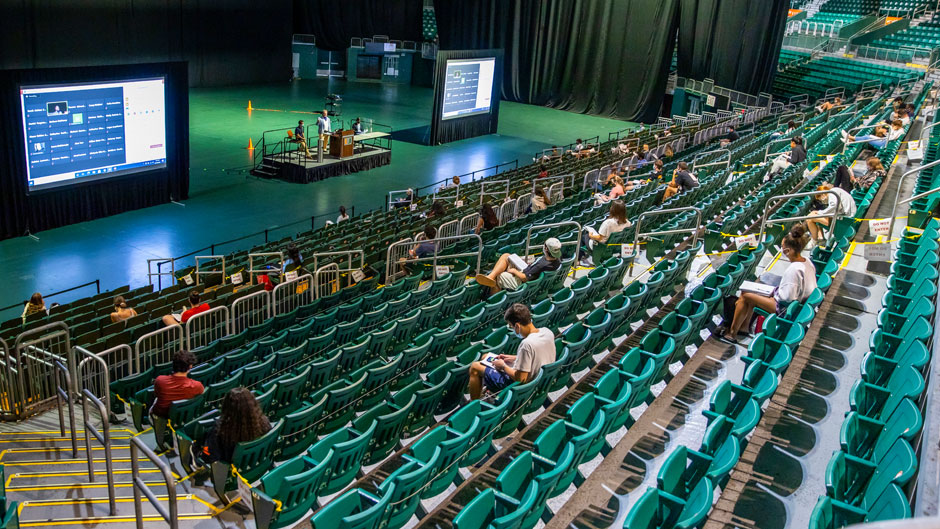Students enrolled in the 2020 election class on Monday learned two top lessons.
The first: allegiance to political parties cannot be swayed. It is a decision made early on in life influenced by family, religion, demographics, and other factors.
“Political ideas are deeply embedded into our psychology,” said Joseph Uscinski, associate professor of political science who co-teaches the class at the University of Miami.
The second lesson is that Florida, as one of the top swing states in the nation, could very well determine the presidential election of 2020. The state delivers 29 electoral votes.
“You all have the good fortune to be taking a class in a place that is really at the centerpiece of this 2020 election,” lecturer and pollster Fernand R. Amandi told the students.
With more than 200 students, the class is also taught by Casey Klofstad, professor of political science. Amandi is a managing partner of Bendixen & Amandi, a top public opinion and strategic communications firm.
The class meets both virtually and in person at the Watsco Center once a week. Taught every two years, it purports to teach that “in a democracy the actions of the government are based on the wishes of the citizenry.”
According to Amandi, every Floridian should be prepared to see the candidates—both presidential and vice presidential—visit the state in the near future. One main reason was detailed in a poll his company conducted in conjunction with the Miami Herald last week.
Of 500 likely voters, the poll (conducted from Sept. 1-4) revealed that former Vice President Joe Biden is leading the race in Miami-Dade County with a 55 percent approval rate against President Donald Trump, who logged a 43 percent approval rate.
“There is no question that Biden seems likely to win Miami-Dade County comfortably,” said Amandi. “The question is, by what margin will he win?”
One trouble spot for Biden is the split in the Hispanic vote in the county. While non-Cuban Hispanics look on Biden favorably, 63 percent of Cuban Americans have an unfavorable view of Biden, he said.
Traditionally, Cuban Americans—who tend to vote for the Republican ticket—have played a major role in swinging elections in the county.
“If you are a Biden supporter, it is troubling that he has a low margin [among those voters],” said Amandi. “It seems like Trump is over performing.”
Cuban Americans approval of Trump is partly based on his strong talk against the Cuban and Venezuelan regimes, both communist strongholds. The political rhetoric has energized “the right wing” of those communities, said Joe Garcia, former U.S. representative and University of Miami alumnus, who was invited to the class as a guest speaker.
“He has run a good campaign for those who feel disenfranchised or left out of the process, but he is also very good speaking to little ethnic communities,” said Garcia, a Democrat. “Trump has spent a lot of time feigning that he is going to invade Venezuela.”
Garcia also sees that Democrats have not fully taken advantage of new technologies to reach voters, especially younger Hispanics.
“Democrats are being outspent both in Spanish social media platforms and Hispanic television,” he said. “I am worried.”
Carlos Curbelo, a Republican, former U.S. congressman, and a University of Miami alumnus, also was a speaker in the class.
Curbelo sees Biden’s lead in the state as “tenuous.”
“The vice president faces big threats to that lead,” he said. Curbelo also said that he believes a lot of Biden supporters care about the issue of law and order that the Trump campaign is trying to put front and center. Trump’s ads have portrayed Biden as someone who wants to defund the police and leave citizens without any police protection.
“A lot of voters feel law and order is more important than COVID-19, yet Biden has spent a lot of money on COVID-19,” Curbelo said. “There is a risk that if COVID-19 continues to dissipate, the Biden campaign has invested so much it could suffer.”
Another threat for Biden in Miami’s Hispanic community is the issue of socialism. The Trump campaign has successfully put the socialist label on Democrats. Biden has lacked a good defensive strategy on this front, said Curbelo.
“He needs to come to Miami and say, ‘I am not a socialist,’” said Curbelo.

